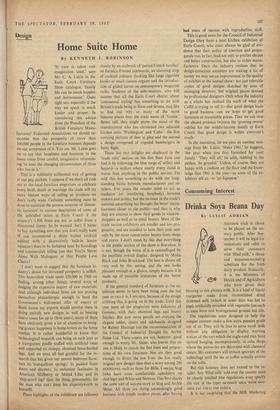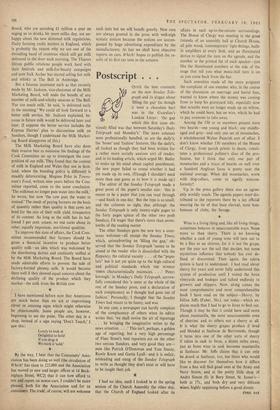Consuming Interest
Drinka Soya Beana Day
By LESLIE ADRIAN
• margarine made from reconstituted dried skimmed milk (which in saner days was fed to pigs), artificially enriched with vegetable fats such as soya bean and hydrogenated ground nut oils.
The regulations seem designed to help the stingier caterers make a few extra pennies profit out of us. They will be free to serve mock milk without any obligation to display warning notices of the sort which the eagle-eyed may have spotted hanging, inconspicuously, in cake shops where the patisseries are decorated with chemical cream. His customers will remain ignorant of the subterfuge until the tea or coffee actually arrives on the table.
But this leniency does not extend to the re- tailer. Any 'tilled milk' sold over the counter must be clearly labelled (the regulations even specify the size of the type) SKIMMED MILK WITH NON- MILK FAT UNFIT FOR BABILS.
It is not surprising that the Milk Marketing Board, who are spending £1 million a year on urging us to drinka bit more milka day, are un- happy about the new skimmed milk regulations. Dairy farming really matters in England, which is probably the reason why we are one of the dwindling band of countries which still get Milk delivered to the door each morning. The Thames Ditton public relations people work hard with their festivals and milk-for-beauty campaigns and now Jack Archer has started selling hot milk and whisky at The Bull in Ambridge.
But a fatuous statement such as that recently made by Mr. Jackson, vice-chairman of the Milk Marketing Board, will undo the benefit of any number of milk-and-whisky sessions at The Bull. `Far too much milk,' he said, is delivered early in the morning.' We could all look forward to a better milk service, Mr. Jackson explained, be- cause in future milk would be delivered later and later. (I suppose the better service includes the Express Dairies' plan to discontinue milk on Sundays, though I understand the Milk Market- ing Board disapprove of this.) The Milk Marketing Board have also done their evasive best to minimise the findings of the Cook Committee set up to investigate the com- position of our milk. They found that the content of milk in England and Wales (but not in Scot- land, where the breeding policy is different) is steadily deteriorating. Magnus Pyke in Towns- man's Food, written nine years before the Com- mittee reported, came to the same conclusion. The milkman no longer puts water into the milk,' he wrote, but now 'the cow puts the water in instead.' The result of paying farmers on the basis of quantity rather than quality is that cows are bred for the size of their milk yield, irrespective of its content. As long as the milk has its hal- lowed 3 per cent. cream, no one cares about its other, equally important, nutritional qualities.
To improve this state of affairs, the Cook Com- mittee recommended that farmers should be given a financial incentive to produce better quality milk—an idea which was welcomed by the distributing dairies and cautiously sniffed at by the Milk Marketing Board. The Board have made admirable efforts to prevent the sale of factory-bottled phoney milk. It would become them well if they showed equal concern about the declining quality of the product which they market—the milk from the British cow.
I have mentioned before now that Americans are much better than we are at improvising clever or amusing signs which might otherwise be objectionable. Some people are, however, beginning to see the point. The other day in a shop, instead of a sign saying 'Don't Touch,' I saw this: Lovely to look at Delightful to hold If you drop it We mark it 'sold.'
* By the way, I hear that the Consumers' Asso- ciation has been doing so well (the circulation of Which? has risen to 222,000 and the Association has moved to new and larger offices at 14 Buck- ingham Street, WC2) that it can now afford to test and report on motor-cars. I couldn't be more pleased, both for the Association and for us consumers. The trade, of course, will not welcome such tests but we will benefit greatly. New cars are always greeted in the press with well-nigh ecstatic notices because the notices are accom- panied by huge advertising expenditure by the manufacturers. At last we shall have objective reports on cars. Which? hopes to publish the re- sults of its first car tests in the autumn.











































 Previous page
Previous page